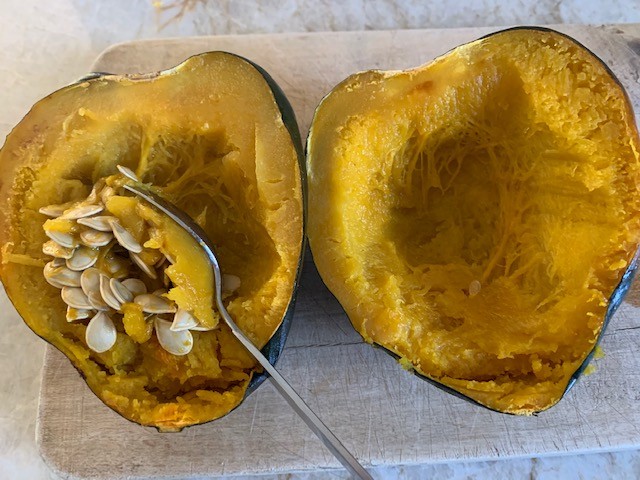
Acorn squash has emerged as a nutritionally beneficial addition to canine diets when properly prepared and served. As confirmed by veterinary experts including Dr. Jerry Klein, Chief Veterinary Officer of the AKC, this winter squash variety is safe for dogs and offers substantial health benefits through its rich nutrient profile. Notable components include vitamin A for digestion and cell growth, beta-carotene for vision health, and various B vitamins that support metabolism. While acorn squash can be served both raw and cooked, proper preparation—removing seeds and skin—is essential for safe consumption. This comprehensive guide examines the role of acorn squash in canine nutrition and provides evidence-based recommendations for its inclusion in dog diets.
Acorn Squash Nutrients and Taste Profile for Dogs
Nutrient Composition
Acorn squash provides essential nutrients beneficial for canine health. According to studies, the key nutritional components include vitamin A for digestion and cell growth, beta-carotene for eyesight, and additional minerals like magnesium that help process other nutrients. The vegetable contains minimal calories while being fiber-rich, making it an excellent option for weight management in dogs.
Palatability and Taste Response
Dogs experience acorn squash differently from humans due to having only around 1,700 taste buds compared to humans' 9,000. When properly prepared, dogs generally respond positively to acorn squash's naturally sweet and nutty flavor profile. The sweetness tends to make it appealing, though individual dogs may have varying preferences. Senior dogs particularly benefit from its soft texture and nutrient density when cooked appropriately.
Can Dogs Eat Acorn Squash? A Complete Safety Guide
Safe Preparation Guidelines
Acorn squash requires specific preparation to be safely consumed by dogs. The skin and seeds must be removed as they can cause digestive blockages. While raw acorn squash is technically edible, cooking through steaming or roasting makes it more digestible. The squash should be served plain without any seasonings, butter, or additives that could harm dogs. For raw feeding, the squash must be pureed or cut into very small pieces to prevent choking.
Portion Control and Introduction
Start with small amounts when introducing acorn squash to monitor for any adverse reactions. While safe for daily feeding, it should only comprise a portion of a balanced diet. For dogs with sensitive digestion, consult a veterinarian before adding acorn squash to their meals. The fiber content makes it especially beneficial for overweight dogs when used as part of a controlled diet plan.
Health Benefits and Nutritional Value of Acorn Squash for Dogs
Physiological Benefits
Acorn squash provides multiple health benefits including skin hydration, better digestion, and support for stronger muscles, kidneys, and nerves. The vegetable aids in maintaining proper digestive health through its fiber content and supports cellular repair processes through vitamin C. Unlike other squash varieties discussed previously, acorn squash specifically helps improve coat shine and skin health due to its unique combination of folate and B-vitamins.
Detailed Nutrient Analysis
The precise nutritional profile per 100g of squash includes: 31 kcal energy, 0.64g protein, 0.57g fat, 6.91g carbohydrates, 1.5g fiber, and 2.76g sugars. Key minerals include 23mg calcium, 0.31mg iron, 108mg potassium, and 17mg sodium. The vegetable should comprise 15-25% of a healthy dog's diet as part of the recommended fruit and vegetable intake, providing a nutrient-dense option that supports overall canine health.
Acorn Squash for Dogs: Optimal Serving Methods
Seasonal Considerations and Storage
While the previous sections covered basic preparation, optimal serving requires attention to seasonality. Acorn squash is best served to dogs when in peak season during fall and early winter, as this ensures maximum nutrient retention. For storage, keep uncut squash in a cool, dry place for up to 2 months. Once cut, store prepared portions in an airtight container in the refrigerator for 3-4 days maximum to maintain freshness and nutritional benefits for your dog.
Alternative Serving Suggestions
Moving beyond basic steaming or roasting discussed previously, acorn squash can be incorporated into homemade dog biscuits as a nutritious ingredient. When making treats, ensure the squash is thoroughly cooked and pureed before mixing with other dog-safe ingredients. This provides variety in texture while maintaining the nutritional benefits. However, treats should not exceed 10% of daily caloric intake.
Conclusion
Acorn squash proves to be a nutritious and generally safe addition to a dog's diet when properly prepared. The research demonstrates that this vegetable offers numerous health benefits through its rich nutrient profile, including vitamin A, beta-carotene, and essential minerals, while being low in calories and high in fiber. Dogs typically respond well to its naturally sweet flavor, despite having fewer taste buds than humans. Key findings emphasize the importance of proper preparation - removing seeds and skin, cooking thoroughly, and serving plain without seasonings or additives.
For optimal results, acorn squash should comprise 15-25% of a dog's recommended fruit and vegetable intake, with peak nutritional benefits during fall and early winter months. The vegetable's versatility allows for various serving methods, from simple steaming to incorporation in homemade treats. Moving forward, pet owners should focus on gradual introduction, proper portion control, and consultation with veterinarians, particularly for dogs with sensitive digestion. These findings support acorn squash as a valuable dietary component that can contribute to a dog's overall health, digestion, and weight management when appropriately integrated into a balanced diet.